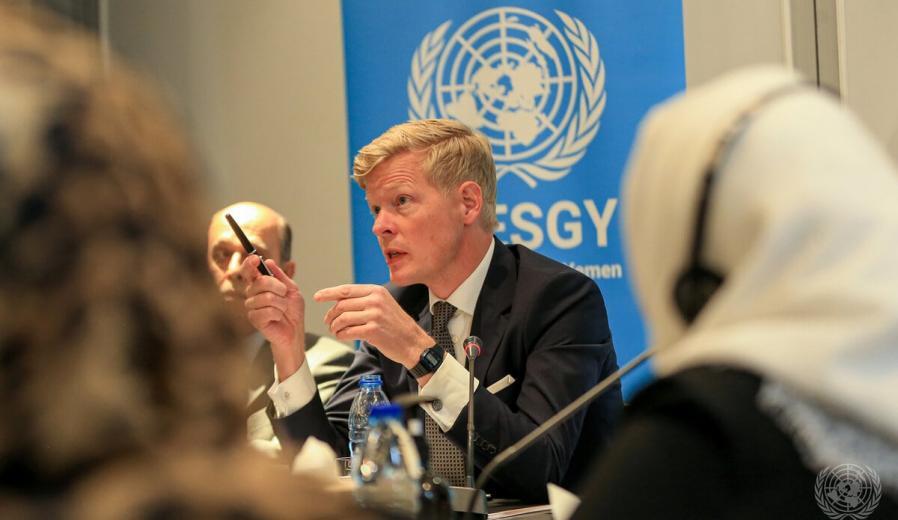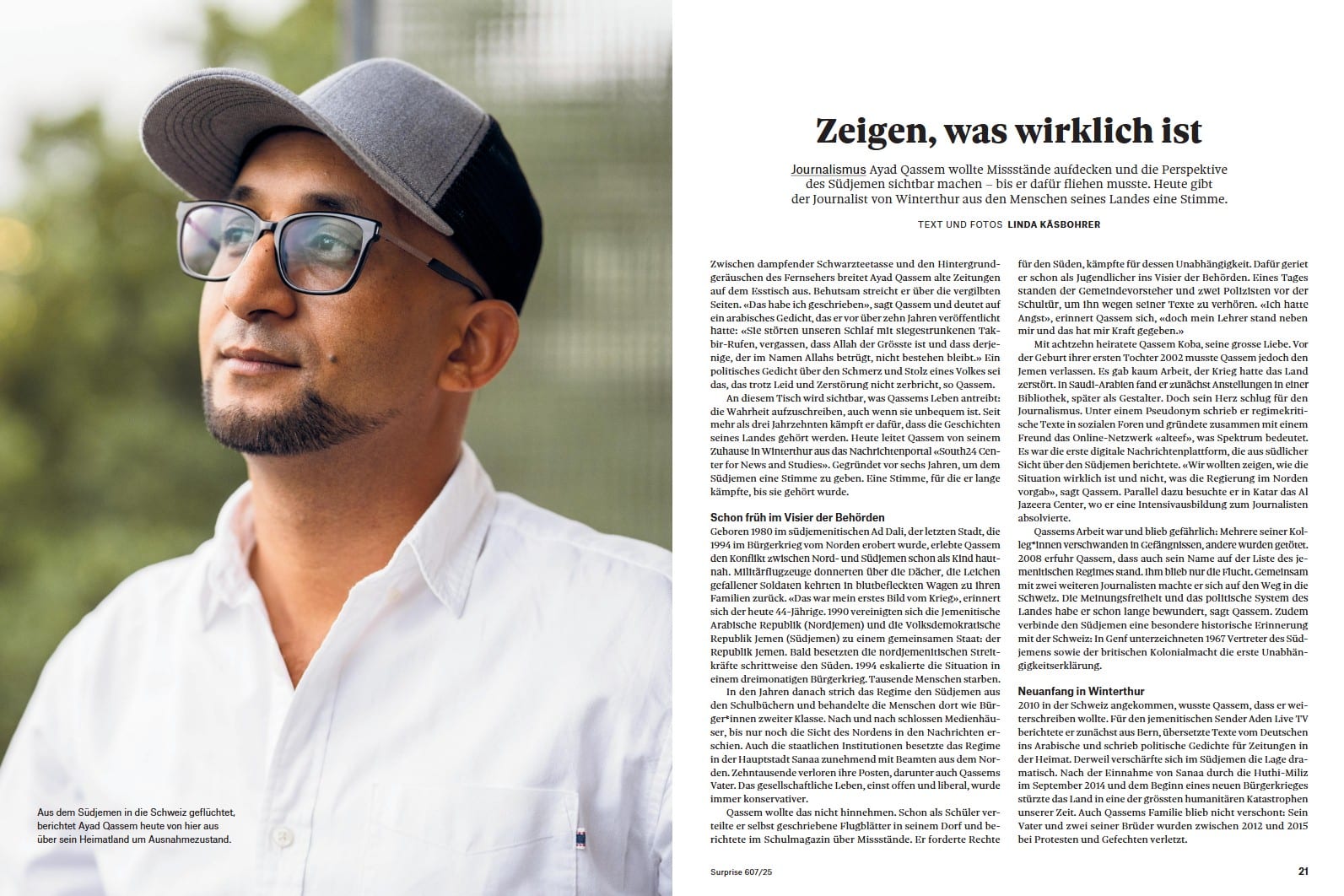
آخر تحديث في: 09-03-2022 الساعة 8 مساءً بتوقيت عدن
Jacob Al-Sufyani (South24)
The United Nations Special Envoy of the Secretary-General for Yemen Hans Grundberg announced on Monday the start of "bilateral consultations between the Yemeni parties" in the Jordanian capital city Amman. The Swedish diplomat said it would improve development of his framework that would define an inclusive process for making progress toward a political settlement.
These consultations are considered the first of their kind since Grundberg officially assumed his duties as an envoy to Yemen early last September. He succeeds UK's Martin Griffiths. The consultations was welcomed by the US Embassy in Yemen. They also expressed their hope that it would provide an opportunity for the Yemeni parties to reach a sustainable political solution that would stop the war.
Many were not optimistic about these consultations, given the history of failure that accompanied the efforts of the three UN Envoys before Grundberg, while others considered that these consultations could stir the stagnant waters and push the parties to the negotiating table, especially with its openness and accommodating new parties.
Consultations
According to the UN announcement, Grundberg will hold bilateral meetings with "leaders of the General People's Congress; delegations from the Islah Party, the Yemeni Socialist Party and the Nasserist Organization" during the first week of consultations.
The announcement stated that "more than 100 Yemeni men and women from political parties, the security sectors, the economy, and community organizations will be consulted in the coming weeks."
The announcement added, “the Special Envoy will continue engaging with the Government of Yemen and Ansar Allah [Houthis] as well as with regional and international stakeholders. Efforts will also be made to consult the broader Yemeni public, including youth, to ensure the Framework reflects Yemenis’ interests and aspirations."
Regarding the objectives of these consultations, the statement said: "These consultations will focus on defining the immediate and long-term priorities for the political, security and economic tracks." "It will inform the development of the Special Envoy’s Framework which will outline an inclusive multitrack process to address immediate needs and long-term issues required to make progress towards a political settlement," he said.
According to "South24" sources, the STC will also participate in these consultations during the second week of them. The North Yemen's Houthis have not commented on these consultations so far.
Yesterday, Grundberg met with representatives of the Islamic "Islah" party in Amman. According to the Islah official website [1], the party leadership discussed with the UN Envoy "the foundations for establishing peace" and emphasized the "three references". On Wednesday, he met with representatives of the Yemeni Socialist Party.
Regarding these consultations, political analyst Salah Al-Saqladi told "South24": "If there is anything remarkable about the matter, it is the resumption of the UN Envoy's consultations with the Yemeni forces after a period of cessation."
Al-Saqladi added "as for the consultations, we have not seen or heard anything new, at least so far." "Envoys prior Grundberg had made the same statements, and had several rounds of consultations with almost all the powers. But it did not lead to anything important. Failure was its salient feature," he continued.
Al-Saqladi attributed the reasons for the failure to the fact that "some parties to the conflict were able to resolve matters militarily, especially in the early years of the war."
Disabling the Riyadh Agreement
As for journalist and political researcher Nabil al-Sufi, he believes that the announcement of these consultations comes to create "a parallel with the news that talks about the Second Riyadh Conference regarding the Riyadh Agreement, and the negotiations on changing the Yemeni Presidency Council."
Al-Sufi told "South24": It is similar to what was happening with the Riyadh agreement talks when Martin Griffiths was an Envoy before Grundberg. Griffiths has been pursuing the disabling of the Riyadh Agreement. The UN is afraid of a local movement that will pull the rug from under them."
He continued, "The UN is supposed to support any partial solutions, because in the end partial solutions will come with other solutions. This is what I see happening, and it is a parallel movement from the UN with everything that is being reported about upcoming steps and changes."
STC participation
The Deputy Director of the STC Media Department Mansor Saleh confirmed that they had received an invitation from the UN Envoy to participate in the Amman consultations.
The Deputy Director of the STC Media Department Mansor Saleh confirmed that they had received an invitation from the UN Envoy to participate in the Amman consultations.
Mansor told "South24," "Yes, an invitation to STC by Mr. Grundberg was received. Certainly, the STC will respond to it out of its commitment and keenness to make any effort to reach a comprehensive peace process succeed." He added, "This is in line with the STC position, which it has previously expressed on several occasions."
The participation of the most powerful party in South Yemen is the first of its kind. Grundberg had met repeatedly with senior STC officials since his appointment, and had visited Aden twice, last October and November. STC officials constantly stressed the need to include them in negotiations for a political solution, without preconditions.
On this, Nabil al-Sufi considered that the STC participation in the Amman consultations would “at least allow the UN to hear a new, different voice that has a presence on reality.” He added, "The legitimacy [government] is broken and it no longer has a presence or a role domestically, and it is a group of employees abroad."
Al-Sufi indicated that these consultations may contribute to removing theSsouthern issue "from the local conflict to a point of negotiation."
But the political researcher said he had no "optimism" about these or other international discussions. He pointed out that international organizations "have not made any breakthrough in the crisis since 2011 until today."
Political analyst Salah Al-Saqladi believes that the STC's participation in these consultations "should be forward-looking only."
Al-Saqladi said: "The STC should not accept, in the consultations for the final solution to the crisis, that it be just an entity above a table, but rather a representative of the Southern side in contrast to the Northern one."
The three references
The Yemeni Islah party officials, in their meeting with Grundberg on the second day of the Amman consultations, stressed the need for any negotiations for a political solution to be based on the three initiatives [Gulf Initiative, National Dialogue, Resolution 2216].
The party also emphasized that "negotiating procedures for the final solution, when it is reached, should be between two parties: the legitimate government as a legitimate party, and the Houthi militia as a coup party."
Regarding the three references that the Islah insists upon, Mansor Saleh said: "These references and their likes do not mean anything to South and they are not able to offer Southerners solutions to their political issue."
STC officials added that "any talk about sticking to it [the three references] is a provocation, with the aim of thwarting any peace process before it begins. Such references, which some exaggerate, are a problem in and of itself, not a solution, and this is how we look at it."
Saleh pointed out that the STC premise for participating in any consultations or negotiations is "the fair and true representation of South in any peace process. The STC's position is clear that it will not engage in any peace process that did not participate in the design of its framework and does not reserve for it and for South an effective participation that meets the goals and aspirations of the southerners."
He pointed out that the STC "is looking for a real and fair peace." He stressed that this "will only be achieved through a political process in which everyone, led by the STC, participates in designing and drawing its framework."
Salah Al-Saqladi held these references responsible for the "continuous failure" of international efforts to reach a political solution to the crisis so far.
Al-Saqladi said: "Some forces, especially within the parties, the forces of the 1994 war and the utilitarian group surrounding Yemeni President Hadi have adhered to old requirements whose political life has ended, and the war has encircled them and exceeded the reality and facts of today," as he put it.
He added, "Therefore, the success of the Amman consultations and the consequent final solution consultations is dependent on consultations taking place at a round table in which all these forces acknowledge that the solution must be based on the changes that exist today on the ground, and not on references, constants, and alleged red lines whose default political life ended years ago".
Al-Saqladi stressed the need to make the Southern cause "a main point on the discussion table." He pointed out that the solution to this issue is based on the North-South dichotomy, as it was created from the womb of the failure of the unitary project between two states.
He also considered that "the parties to the conflict and war should not be reduced to the so-called legitimate authority and the Houthis, but rather to all the active forces on the ground, especially the STC."
It should be noted that, since his appointment, Grundberg had shown a kind of understanding of the reality of the political and military map in Yemen, and called for urgent negotiations between the parties to the crisis "without preconditions" [2]. This approach differed somewhat from his predecessors, as their efforts continued to revolve in a vicious circle of the Houthis and Yemeni "legitimacy".
Aden office director at South24 Center for News and Studies, journalist and editor
Photo: The UN envoy announces the start of the Amman grills, March 7, 2022 (official)

قبل 3 أشهر

قبل 3 أشهر